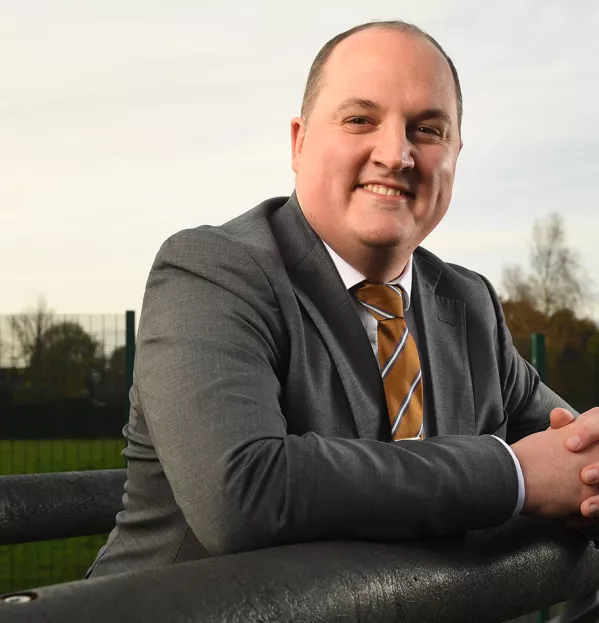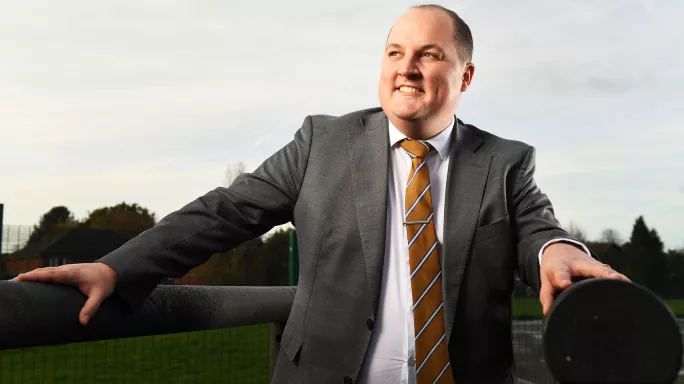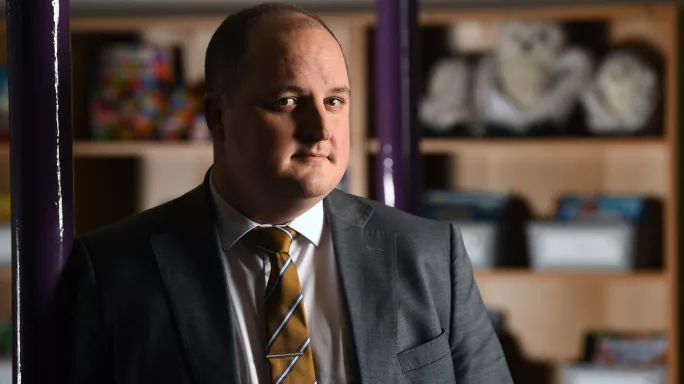10 questions with... David Clayton

David Clayton is the chief executive of Endeavour Learning Trust, responsible for six schools across the North West.
He joined the trust last summer after leading other academy trusts in the area. Having originally trained as an accountant, he was inspired to move into education after working with school clients.
David spoke to Tes about finding his place at secondary school, inclusion in schools and the tensions that can sometimes arise from the accountability system.
1. Who was your most memorable teacher and why?
My secondary drama teacher Mrs Whittam; she helped me to improve my self-esteem during a difficult transition to secondary school. My dad had passed away when I was in Year 5 and I was feeling quite lost in this new environment, which meant I ended up being off school at least one day a week.
Mrs Whittam noticed I enjoyed the performing arts and supported me to express myself, which helped me to find my place at school.
2. What were the best and worst things about your time at school?
The staff at my primary school championed and nurtured me, so I’ve really enjoyed rediscovering the joy and wonder of early years at Endeavour.
I was at secondary school during the Section 28 period so schools weren’t talking about diversity and difference, which meant I felt very isolated as a gay teenager. But when I look at schools now and how far we’ve come, I feel proud.
3. Why do you work in education?
I originally trained as an accountant and had some education clients, where I saw the profound difference people working in schools were making to children’s lives. I realised I wanted to work with that same sense of purpose.
I still feel that same sense of privilege to have the opportunity to make a difference every day.

4. What are you most proud of in your career and what do you regret?
I’ve worked really hard to champion the children who are our most vulnerable and get them the support and provision they deserve. I am passionate about true inclusion and ensuring all children have a sense of belonging.
Ultimately, I feel I’ve left each school I worked with in a better position.
I think I lacked the courage back in the early stages of my career to be an authentic leader all the time, which links back to feeling like I had to hide certain parts of myself when I was at school.
5. Who is in your perfect staffroom?
My perfect staffroom would be a blend of those from all the schools I’ve worked in, where I’ve met many exceptional people who continue to shape my thinking. What matters to me is that we’ve got a group of colleagues who are as motivated as I am to ensure every child can experience the education they need.
6. What are the best and worst aspects of our school system?
The best aspect is the people. Covid particularly shone a spotlight on how dedicated they are - not just to educating children but also to supporting them and their families through things like delivering food parcels.
The most challenging aspect of the system is the tension that can sometimes arise between the accountability system and doing the right thing for pupils. For example, the focus on English Baccalaureate participation is not right for some of our children.
I encourage school leaders to be bold and take the right steps for their communities with the confidence that if they get it right for their children then the accountability system will recognise that.
7. If you became education secretary tomorrow, what would be the first thing you would do?
I’m not anti-inspection or anti-accountability but the work we do in schools is often very complex. I don’t think it’s realistic to summarise the effectiveness of a school in one word. There’s a much more useful way of doing that which still holds schools to account and allows them to reflect on how to improve.

8. Who do you think has made the biggest difference in education in the past 12 months?
We need to do more to promote and celebrate the teaching profession as a whole rather than individuals with the highest public profiles.
As a trust leader, I remain mindful that I’m not the impact maker - I’m the facilitator. My job is to create the conditions where our team have the support they need to give the best of themselves each day and give our young people the best experience.
9. Your own teachers aside, who in education has influenced you the most?
Since I was seven, I’ve been part of a local music and drama group run by a husband-and-wife team, Paul and Jo, who’ve dedicated their lives to education as primary school teachers and then leaders and school improvers. If I can have half the impact on young people in my career that they have had, I’ll retire a very happy man.
10. What will our schools look like in 30 years?
The pace of technological change continues, and schools will need to adapt to things like artificial intelligence.
But while we’ll have to think about how to use those technologies, we can’t ever allow them to replace that connection between a teacher and children because that relationship is the core of what we do.
David Clayton was speaking to Jasmine Norden
For the latest education news and analysis delivered directly to your inbox every weekday morning, sign up to the Tes Daily newsletter
You need a Tes subscription to read this article
Subscribe now to read this article and get other subscriber-only content:
- Unlimited access to all Tes magazine content
- Exclusive subscriber-only stories
- Award-winning email newsletters
Already a subscriber? Log in
You need a subscription to read this article
Subscribe now to read this article and get other subscriber-only content, including:
- Unlimited access to all Tes magazine content
- Exclusive subscriber-only stories
- Award-winning email newsletters
topics in this article



